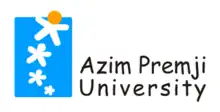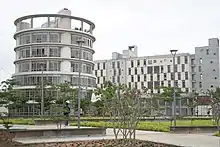 Azim Premji University Logo | |
Motto in English | Work towards a just, equitable, humane and sustainable society. |
|---|---|
| Type | Private |
| Established | 2010[1] |
Academic affiliation | UGC |
| Chancellor | Azim Premji |
| Vice-Chancellor | Indu Prasad |
Academic staff | 180 |
Administrative staff | 75 |
| Undergraduates | 590 |
| Postgraduates | 765 |
| Location | , , 12°51′46″N 77°39′54″E / 12.8627°N 77.6649°E |
| Affiliations | Azim Premji Foundation |
| Website | azimpremjiuniversity |
Azim Premji University is an Indian non-profit private university, located in Bengaluru, Karnataka. It was established by the Azim Premji University Act (2010)[2] and recognised by the University Grants Commission under Section 2F.
The university started offering postgraduate programmes in 2011[3] and undergraduate programmes in 2015 along with a host of other short-term diplomas and certificate courses. Its mandate is to run teaching programmes and conduct research to contribute to the social sector in India.[4]
A second Azim Premji University campus in Bhopal[5] opened in July 2023. Two more campuses are being planned in northeast [6] and eastern regions[7] of India.
History
The university was established by the Azim Premji Foundation.[8] [9]
The Azim Premji Foundation was to be funded solely by Azim Premji by way of transfer of his personal shares to the Foundation. The objective of the funding was to facilitate universalisation of primary education rather than serve as a constraint in achieving it. The Foundation began its work in Karnataka and Andhra Pradesh in 2001 where the state leadership and education departments were supportive of its mandate.
The University is philanthropic in nature and currently, 90% of the expenditure is borne by the Azim Premji Foundation.[10] Even in the long term, the Foundation endowment is designed to support 80% of the overall expenditure of the University, with only 20% coming from programme fees and other income.
Campus
The university's Bangalore campus is located on 90 acres spread around Sarjapur-Attibele Road.[11]

The campus offers a space of 2.6 million square feet with classrooms and residential facilities for students, faculty and guests. The campus includes a library, seminar halls, an open-air amphitheatre, outdoor playfields and an indoor sports complex.
Library
The library is spread over 43,837 square feet and is a part of a network of Azim Premji Foundation libraries around the country which serves students and members of the Foundation. All Foundation and University libraries are open to the public. Registered external membership is provided for individuals, organisations, and University partners who are scholars, researchers, and activists working on focus areas of the University's work.[12]
Azim Premji Schools
One among the nine Azim Premji Schools set up by the Foundation is housed on the campus. Like the other Azim Premji Schools, it is free of cost and welcomes children from disadvantaged backgrounds while being open to all. Currently, it has classes up to primary but will eventually, serve K-12 children between 3 and 18 years of age. The medium of instruction is English and there is a significant focus on health and nutrition.
Bhopal Campus
The Bhopal campus is a 50-acre sustainable campus whose design was inspired from various local architectural styles of Madhya Pradesh. Said to be one of the few in India, it has an extensive water conservation system facilitating conservation of rainwater and a 50 kilo litre water treatment facility. The University campus is designed for barrier-free access to all the facilities by persons with disabilities. Hostel blocks have rooms designed to ease wheelchair movement. The academic blocks have restrooms on each floor that are designed in such a way that persons with disabilities can use them with ease.[13]
Academics
Academic Programs
The university is organized into 5 schools, a university wide research centre and several other research centres. The university offers 4-years undergraduate degrees in BA and B.Sc. for humanities and sciences respectively.[14] The university offers post graduate programmes in Education, Development, Law and Development, and Economics.
The university also offers a number of diploma programmes and certificate courses on diverse subject areas including, Research for Social Action, Exploring Sustainability in the Indian context, Mapping and Geographical Information Systems using Quantum GIS, Perspectives on Public Education System, etc.
The Schoolbooks Archive
The Schoolbooks Archive,[15] launched November 2021, is a free, open-access, digital collection of 5,724 items, schoolbooks and related documents, dating as far back as 1819, from various regions of South Asia. The archive covers books in all languages and all school subjects that have been written and/or published in the Indian Subcontinent – India and neighbouring South Asian countries. As part of this initiative, a physical exhibition is being held in different parts of the country.
Research
Research in Azim Premji University is primarily focused on social sciences. The emphasis of the research is on contributing to practice on the ground in India's vast social sector and on high-quality academic scholarship in the areas of development, education, public policy, governance, sustainability, and equity. The university has a Research Funding Programme supported by the Foundation to strengthen and supplement existing efforts in these areas.[16]
Centre for Climate Change and Sustainability
The centre seeks to strengthen India's response to the climate crisis. Set up in 2019, the centre uses research, education, and sustainability actions to address the challenges of climate change.[17] This includes research on climate change and urban sustainability, publication of books, research papers, and popular articles as well as the fostering of research-based climate action through an annual call for external research proposals on climate change and sustainability. Recent publications include Cities and Canopies: Trees in Indian Cities,[18] Where have all our Gunda thopes gone.[19]
Centre for Sustainable Employment
Established in 2017, the centre aims at generating and supporting research in the areas of job creation, employment, and sustainable livelihoods. The centre conducts primary surveys exploring a range of labour market issues including measurement of work, discrimination in the labour market, the impact of COVID-19 on workers,[20] NREGA and the Urban Employment Guarantee Scheme. SWI 2018, the first State of Working India (SWI) report,[21] provided a comprehensive overview of India's labour market. SWI 2019 put together four policy papers to examine the possibilities for employment creation through an urban job guarantee programme and universal basic services provisioning while demonstrating the scope for fiscal expansion and the imperative need for a well-articulated industrial policy.[22] SWI 2021 looked at the devastating impact of the pandemic on India's labour market including the disproportionate impact on women and young workers and the implications for poverty and inequality in the country.[23]
Centre for Local Democracy
The centre, set up in 2020, engages in multiple areas of action, including research grants; a local democracy pilot project in Jharkhand initiated to create and disseminate inspiring stories of local democracy in practice and offering a Continuing Education Programme, ‘Local Democracy: Theory Policy and Practice’. [24]
Publications
Azim Premji University publications, available online and in print, are all focussed on promoting dialogue among school teachers, practitioners and educationists on current discourses and perspectives on education, classroom pedagogy, research and on-ground experiences.
iWonder…is a biannual science magazine for middle and high school teachers. It is published in three languages, English, Kannada and Hindi.[25]
Learning Curve is a triannual magazine on primary school education for teachers, heads of schools, DIET officials and anyone interested in education. is a science magazine for middle and high school teachers The magazine is published in three languages, English, Kannada and Hindi.[26]
Pathshala Bheetar aur Baahar is a quarterly publication in Hindi that explores issues of confluence in education and society. [27]
Student life
Aspects of student life include:

- In “Pahal”, students engage with social causes ranging from the education of disadvantaged children, working with the community surrounding the campus, environmental concerns, blood donation camps etc.
- The “Kaapi Aur Charcha” series invites practitioners from various fields to engage in informal talks with the students.
- Publications: Student publications “Karvan” and “Student Journal of Education and Development”.
- UNMUKT, the annual cultural festival.
- Clubs including cinema, theatre, literature, quiz, photography, and sports.
- “Debating Development” is a forum to debate contemporary social issues.
Alumni
Eight cohorts of about 2300 students from the master's programmes have graduated and almost 100% of them have received job offers on campus or outside from a range of organisations. Including the graduates of 2021, the total strength of alumni is 2700 of which 87% are from PG and 13% from UG programmes.[28]
Translations
Among the largest of such initiatives in the country, the Translations Initiative, Anuvada Sampada,[29] facilitates the reach of high-quality learning material in higher education to graduate and PG students in Indian languages (currently, Hindi and Kannada).[30] The initiative has a network of 450 translators in 20 leading academic institutions. The belief that led to this initiative is that the availability of quality resources in Indian languages will support students to engage more deeply and thoroughly with concepts and ideas in higher education.[31]
References
- ↑ "Our Story- Azim Premji University". Retrieved 8 June 2023.
- ↑ "KARNATAKA ACT NO. 14 OF 2010" (PDF). kshec.ac.in/. Archived from the original (PDF) on 29 October 2021. Retrieved 1 October 2020.
- ↑ "Azim Premji varsity opens the door to students". The Hindu. 30 March 2011. ISSN 0971-751X. Retrieved 23 March 2023.
- ↑ "Azim Premji Foundation". Azim Premji University. Retrieved 11 January 2023.
- ↑ "Azim Premji University and Software Center in Bhopal, 50 Acres Land Alotted | World 360 News". world360news.com. Retrieved 11 January 2023.
- ↑ Desk, Sentinel Digital (22 May 2022). "Bodoland Territorial Council signs MoU with Azim Premji University - Sentinelassam". www.sentinelassam.com. Retrieved 11 January 2023.
- ↑ "Ranchi To Get Azim Premji University". Outlook India.
- ↑ "Azim Premji Foundation". azimpremjifoundation.org. Retrieved 23 March 2023.
- ↑ "Our story". Azim Premji University. Retrieved 8 June 2023.
- ↑ "Tech's biggest philanthropists, from Premji to Zuckerberg". The Economic Times. 7 May 2022. ISSN 0013-0389. Retrieved 23 March 2023.
- ↑ "Contact Us". Azim Premji University. Retrieved 8 June 2023.
- ↑ "Our Library". Azim Premji University. Retrieved 23 March 2023.
- ↑ "Our sustainable campus". Azim Premji University. Retrieved 27 May 2023.
- ↑ "Research Centres". Azim Premji University. Retrieved 23 March 2023.
- ↑ "Azim Premji University launches archive of old schoolbooks". The New Indian Express. Retrieved 11 January 2023.
- ↑ Moussa (21 September 2020). "Azim Premji University launches Research Funding Programme (India)". Concoursn.com (in French). Retrieved 23 March 2023.
- ↑ "Climate change is adversely affecting health. Are people aware?". Financialexpress. Retrieved 11 January 2023.
- ↑ "Review: Cities and Canopies: Trees in Indian Cities by Harini Nagendra and Seema Mundoli". Hindustan Times. 28 June 2019. Retrieved 11 January 2023.
- ↑ "Bengaluru: Researchers, students transform years of ecological research into bilingual storybook". The Indian Express. 7 April 2021. Retrieved 11 January 2023.
- ↑ "Covid-19 underscores MGNREGA's role as a safety net". Times of India Blog. 20 November 2022. Retrieved 11 January 2023.
- ↑ "Azim Premji University presents its first 'State of Working India' report". Bangalore Mirror. 4 October 2018. Retrieved 11 January 2023.
- ↑ "Extending MGNREGA to urban areas will create 50 million jobs: State Of Working India 2019 report". The Indian Express. 16 April 2019. Retrieved 11 January 2023.
- ↑ "COVID-19 first wave pushed 23 crore Indians into poverty: Azim Premji University". Business Today. 6 May 2021. Retrieved 11 January 2023.
- ↑ "Centre for Local Democracy". Azim Premji University. Retrieved 8 June 2023.
- ↑ "i wonder..." Azim Premji University. Retrieved 8 June 2023.
- ↑ "Learning Curve". Azim Premji University. Retrieved 8 June 2023.
- ↑ "Pathshala Bheetar aur Baahar". Azim Premji University. Retrieved 8 June 2023.
- ↑ "Azim Premji University". Azim Premji University. Retrieved 11 January 2023.
- ↑ "Azim Premji University launches open access digital repository of academic resources in Indian languages". The Indian Express. 20 September 2022. Retrieved 11 January 2023.
- ↑ Pearl D'souza (20 September 2022). "APU launches free Kannada, Hindi reading material repository 'Anuvada Sampada' - Times of India". The Times of India. Retrieved 11 January 2023.
- ↑ "What a look at academic books available in India reveals about the translation and language debate". The Indian Express. 28 October 2022. Retrieved 11 January 2023.